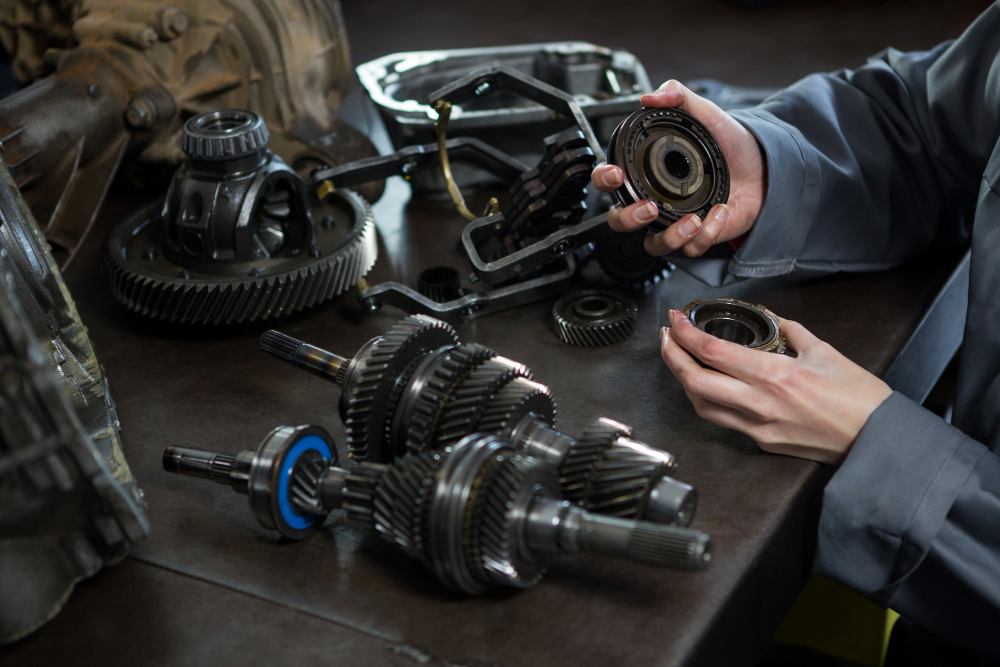Menu

The transmission, often referred to as the car’s gearbox, plays a pivotal role in ensuring smooth and efficient operation. Responsible for the seamless transfer of power from the engine to the wheels, the transmission is a complex assembly of gears, clutches, and other intricate components.
As with any mechanical part, the transmission has a finite lifespan, which eventually raises the inevitable question for vehicle owners: Is it more cost-effective to repair or replace a car transmission when faced with issues? In this article brought to you by Wrights Car Care, we explore this very dilemma.
Before diving into the decision-making process, let’s understand the lifespan of a typical transmission. The longevity of a transmission is influenced by various factors, including driving habits, maintenance practices, and the type of transmission itself.
On average, a well-maintained automatic transmission can last between 100,000 to 200,000 miles while a manual transmission may endure up to 300,000 miles. However, these figures are not set in stone, and individual experiences may vary.
Recognizing the signs of potential transmission problems is the first step in addressing the dilemma of repair versus replacement. Symptoms such as erratic shifting, slipping gears, unusual noises, or a burnt smell emanating from the transmission fluid are red flags that warrant immediate attention. Ignoring these warning signs can exacerbate the issue, leading to more extensive and costly repairs.
When faced with transmission troubles, some car owners may instinctively consider repairing the existing unit. Transmission repair involves diagnosing the specific problem, addressing the faulty components, and restoring the transmission to its optimal functionality. In some cases, the issues may be isolated, making repair a viable and cost-effective option.
However, it's important to bear in mind that the effectiveness of a repair depends on the severity and nature of the transmission problem. Minor issues, such as a solenoid replacement or a fluid leak, may be fixed through targeted repairs. On the other hand, more complex problems such as a complete transmission failure or extensive damage to internal components may render repair less practical.
Opting to replace a car's transmission involves swapping the entire unit with a new or one. This approach is often recommended when the existing transmission is severely damaged, outdated, or has surpassed its expected lifespan.
While the upfront cost of transmission replacement may seem higher than a repair, it can prove to be a more sustainable and economical choice in the long run, especially if the vehicle is relatively new or holds sentimental value.
The decision to repair or replace a car's transmission is not one-size-fits-all. A judicious approach involves a comprehensive assessment of the transmission issues, the vehicle's overall condition, and the economic feasibility of both options.
As responsible vehicle owners, understanding the intricacies of this decision-making process empowers us to make informed choices that align with the longevity and performance of our beloved automobiles.
Have a mechanic inspect your car and remember to visit more than one auto repair shop. Getting multiple price quotes can get you the best deal. If you’re looking for reliable and reputable auto repair service, then consider Wrights Car Care. We are an established business with a commitment to delivering exceptional customer service and top-tier technical expertise.
Wright's Car Care offers the most reliable import and domestic auto repair services. Read our blog posts to learn more about your vehicle.
The cold winter is drawing near. What does that mean for car owners? Well, it’s time to step up your car care game to get your car ready for the…
READ MOREYou know that you need to change your car’s oil at some point to keep everything running smoothly under the hood. Without regular oil changes, the engine would fail sooner than expected, leaving you stranded at the side of the road. But how often should you change your car’s oil? The answer can be confusing, because it depends on several factors. Wrights Car Care is…
READ MOREAs the colder months approach and the days get shorter, it’s important to ensure your vehicle is ready for the…
READ MOREDid you know driving can be a source of stress? For most people, getting behind the wheel causes sweating, light-headedness,…
READ MORE